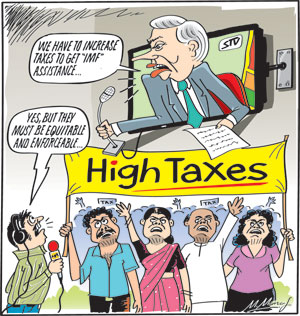Columns
Are the proposed taxation measures equitable and will they achieve fiscal consolidation?
View(s): Fiscal consolidation is an economic prerequisite to achieving economic stability and growth. It is also a precondition to obtain the assistance of the International Monetary Fund (IMF) to rescue the country from the current economic and financial crisis and enable an economic recovery.
Fiscal consolidation is an economic prerequisite to achieving economic stability and growth. It is also a precondition to obtain the assistance of the International Monetary Fund (IMF) to rescue the country from the current economic and financial crisis and enable an economic recovery.
Objective
The objective of the proposed tax reforms that are expected to be discussed in Parliament and passed in November are to increase government revenue to achieve a measure of fiscal consolidation.
However, fiscal consolidation has to be achieved by a two-pronged strategy of increased revenue and decreased expenditure. The expenditure estimates for 2023 does not indicate a decrease in expenditure. In fact expenditure increases are significant.
Pertinent issue
The paramount issue is whether the new taxation measures to achieve fiscal consolidation to obtain IMF assistance equitable and enforceable? Will the taxation measures yield the expected revenue? Will the burden of the increased taxes fall on the rich?
Fiscal consolidation
There can be no doubt whatsoever that fiscal consolidation must be achieved by a two-pronged strategy of increased revenue and drastic reduction of imprudent and uneconomic expenditure. The means by which government revenue is increased must be equitable, effective and enforceable.
The taxation measures would also be more acceptable, if measures are adopted to prune down non-essential unproductive and wasteful public expenditure. As yet, there are no signs of such measures of austerity. In fact, there have been some wasteful expenditures recently.
Equity
One of the most contentious issues in the new tax proposals is the reduction in the threshold for personal taxation to Rs. 1.2 million a year. An income of Rs. 100,000 per month is barely adequate for living with prices soaring. It would have been more equitable had the threshold been increased to Rs 2.4 million a year and the rate of 10 percent applied to the first slab.
Tax evasion and avoidance
Furthermore, the number of income tax payers are small. The number of tax files at the Inland Revenue Department is less than 300,000 and these are mostly employees. The new measures would increase lower income employees, while the rich evade and avoid direct taxation.
Corporate taxes
Corporate taxes are a more complex issue. The proposal to tax exports and especially export crops and ICT services, are ill-advised in the interests of economic growth. No doubt some changes would have to be made to mitigate disincentives to exports and services.
Larger issue
The larger issue is that increased personal taxes do not ensure compliance of many income earners eligible for taxation, especially some of the higher income earners. The number of tax files in the Inland Revenue Department is known to be small. Past efforts to bring in tax evader have not met with much success.
High income earners
Furthermore, it is well known that some of the highest income earners do not declare their actual income. Professionals such as lawyers, doctors and tuition masters are known to declare a fraction of their earnings. Past efforts to tax them have proved a failure.
Tax avoidance
An equitable and effective tax system must recognise that tax avoidance and tax evasion are widespread and that brining tax evaders and tax avoiders to declare their actual incomes is not feasible in the short run. This is why we have advocated an expenditure based taxation system.
Expenditure taxes
An expenditure based tax system would place high taxes on items of “conspicuous spending” such as motor cars. The licence fees, stamp duties on property registration, high property taxes and high cost items of luxury consumption. Such taxes are difficult to avoid and easy to collect and equitable as they fall on the rich and the super-rich.
No reason?
For whatever reason, successive governments have not resorted to such taxation. Is it due to the influence of powerful interests?
Withholding taxes
The proposal to enforce a withholding tax on interest income is a step in the right direction. If properly structured and implemented it could be a progressive, effective and enforceable tax.
Summary and conclusion
Increased taxation is vitally important to raise government revenue that is one of the lowest in the world at around eight percent of GDP. The goal of increasing it to 14.5 percent by 2025 must be achieved through higher taxes that fall on the affluent, the rich and the super-rich that evade and avoid taxes. This can be achieved by only a system of expenditure taxes. The government must also reduce its expenditure to bring the fiscal deficit down.
Final word
Will the government have the political will and capacity to undertake such measures immediately? Can we fulfill the condition of fiscal consolidation to obtain financial assistance from the IMF?
Buying or selling electronics has never been easier with the help of Hitad.lk! We, at Hitad.lk, hear your needs and endeavour to provide you with the perfect listings of electronics; because we have listings for nearly anything! Search for your favourite electronic items for sale on Hitad.lk today!


Leave a Reply
Post Comment